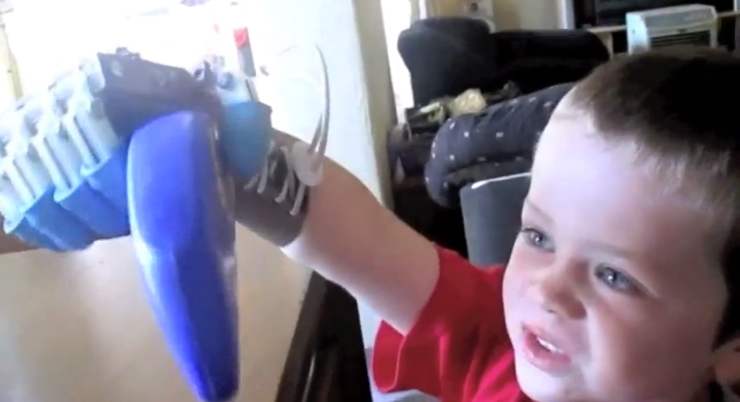
New prosthetic leg controlled by the mind
Doctors in Europe have unveiled the first viable brain-controlled bionic leg in Copenhagen, working without external computers and working much more like a real leg than ever before.

Double Amputee Makes History By Controlling Two Robotic Arms With His Mind
Colorado man Les Baugh has made history with two bionic arms attached at shoulder level, controlled by his thoughts alone. This makes him the first bilateral amputee in the world to do this.

Amputee Builds Prosthetic Leg Out Of Lego
Christina Hunter, a practicing occupational therapist and clinical researcher who lost her foot after a crush injury, has built herself a prosthetic leg out of Lego. Has to be one of the better things you will see all day.
Researchers Create The First Wireless Brain-Computer Interface. Move Things With Your Mind On The Go

Researchers at Brown University have created the first wireless, implantable, rechargeable brain-computer interface. This presents a medical breakthrough for the disabled, which will be tested on humans soon after 13 months of successful trials with monkeys and pigs.
New Retinal Implant 'Alpha IMS' System Restores Sight For The Blind

Advances in the restoration of vision have been fascinating to see, pardon the pun. Argus II relies on an external camera mounted to a pair of glasses, powered by an external processor. However, the Alpha IMS system, Developed by researchers at the University of Tübingen, Germany, uses electrodes placed within the patient's retina, re-engineering the human eye into a prosthetic.

Two Makers Create 3D Printed Prosthetic Hand For A 5-Year-Old Boy
Liam is a 5-year-old South African boy who was born without fingers on his right hand. When his mother stumbled upon the work of two prosthetic hobbyists and shared this story, they went on to create a new hand for the boy, using a 3D printer, bits of cable, bungee cord and rubber thimbles.
Thought-Controlled Artificial Limbs. A Robotic Revolution For Amputees

The world's first implantable robotic arm controlled by thoughts is being developed by a postdoctoral student. The first operations on patients will take place this winter, changing the lives of amputees.
Artificial retinal implant restores vision
Tests on a new kind of prosthetic eye have proven successful, meaning that the technology could someday allow around 25 million people who are blind due to retinal diseases to see in crystal clarity, by having much stronger intercommunication when portraying the image to the brain.
Shiela Nirenberg and Chetan Pandarinath, of Weill Medical College of Cornell University in New York city have tested this retinal prosthetic in blind mice, discovering it gave them the power to see individual dimples on a baby's face. With this success comes the potential of human use.


